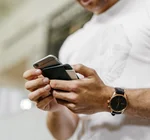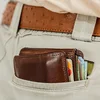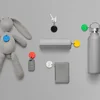

Why We Lose Our Wallets: How Our Memory Works
Spatial memory stores information about your surroundings and about the constant small changes within it. Because your wallet moves around when you do, your spatial...
Lifestyle
Expected read time: 5 min
Fresh finding tips delivered straight to your inbox!
Your wallet is one of the top 5 items you are most likely to lose and in a survey conducted by MoneyTips, 6 out of 10 people reported losing their wallets in the last 12 months.


Realizing you lost your wallet will immediately increase your stress levels but try to stay calm and use one of the below techniques to try and find your missing wallet as soon as possible.
1. Close your eyes and take a deep breath
Calm down and clear your mind by taking a few deep breaths before you start searching. This will slow down your heart rate and lower your stress so that you can focus on the task of finding your missing wallet.
_________________________________________________
2. Create context
Think about the last time you remember seeing your wallet. Paint a mental picture with as many details as you can remember and think about what you did next.
Did you go for lunch? Maybe clear your desk? Think about the specifics and let your mind sort through the details of your day for something useful.
_________________________________________________
3. Check the usual spots
We’re creatures of habit, so chances are your wallet is just a few inches from its usual spot, buried under some papers or your clothes.
Check the most common places where you put your wallet down and clean the clutter around it as you go, to make sure you don’t miss any hidden spots.
_________________________________________________
4. Widen the search area
If you still can’t find your lost wallet, widen the search and systematically move your search from one room to the next.
Move bags and pillows, check the fridge and drawers, search every pocket on your backpack and your clothes.
Always looking for your wallet?
Get tips on how to quickly find your things!
Thank you for subscribing, let's find it together.
There are some brain training techniques you can do to boost your mental abilities, including remembering where your wallet is.
A) Take a mental picture
The next time you take out your wallet, be conscious about where you put it and make a mental note about its new location and nearby objects.


Make it even easier to remember by actually saying the location of your wallet out loud, for example: ‘I put my wallet in my blue backpack.’
B) Get a good night's sleep
You’ve probably heard this one before but getting a good night’s sleep is crucial.


For over 60 years, scientists have been conducting experiments about the effects sleep deprivation has on our memory and the results have always shown that lack of sleep affects our ability to remember, not only when it comes to our surroundings but also in other areas where memory is crucial.
C) Train your brain like a muscle
Technically, your brain is not a muscle, but exercising it like one will improve your brain function and reduces the risk of cognitive-related diseases.
Here are a few common ‘exercises’ you can do to help your brain power grow stronger:
D) Chunking
Chunking is taking individual pieces of information and organize them into separate groups based on their shared characteristics.


For example, you can run through a short mental to-do list every time you step out the door:
✔️ Wallet ✔️ Keys ✔️ Phone
It will save you precious minutes every time you go somewhere.
By grouping individual chunks, you basically organize your general mental to-do list into smaller, more manageable lists that you can remember more easily.
E) Use a wallet tracker
This one’s a bit of a cheat since you’re not only using your brain, but it’s a good accessory for anyone that can’t rely on their brainpower alone.
A wallet finder connects to an app on your phone using Bluetooth and the connection usually works both ways, so you can then keep track of your phone as well as your wallet.


The Chipolo CARD wallet finder also offers a few additional helpful features.
You can set up range alerts to prevent yourself from leaving your wallet behind in the first place or you can share your wallet tracker through the Chipolo app with your loved ones so that if your wallet does ever get lost, they can help you search for it.
F) A designated spot for your wallet
Daniel Levin is a neuroscientist who came up with a simple tip that can help you keep track of the things you move around the most, like your keys, your phone, your wallet or, in his case, his passport.
In his TED talk, he suggests that you designate a place in your home where you keep any objects that you misplace the most.
We believe that the above suggestions will help you keep your wallet safe, but just in case, you should take a photo of your ID, your driver’s license and your credit cards. It will save you a headache or two if your wallet does go missing and you have to replace them.


Spatial memory stores information about your surroundings and about the constant small changes within it. Because your wallet moves around when you do, your spatial...


Would you return a lost wallet? If you’ve ever reached into your pocket, only to find your wallet isn’t there, you’re not the only one. Wallets are one of the 5 five...


The average American loses about $5,591 worth of personal items in a lifetime. If you can relate, stop putting an unnecessary dent in your wallet and check out these 6...
Join our newsletter to get 10% off Chipolo POP, plus get weekly updates on deals, tracking tips and tricks, and a dash of fun.